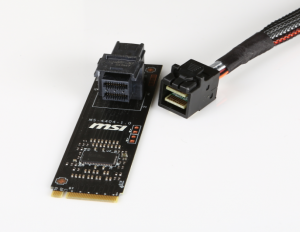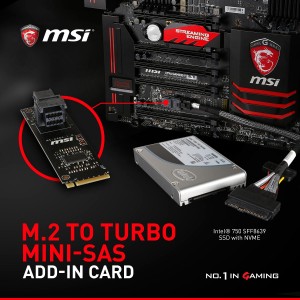Hot off the heels of Intel’s SSD 750 series launch, and with NVMe-based SSDs beginning to gain momentum in the consumer marketplace, MSI is preparing to launch an adapter card to provide support for SFF-8639 drives to its X99 motherboards.
Intel’s SSD 750 series drives utilise four lanes of PCIe Gen 3 connectivity in order to provide a 32Gbps bandwidth. Two connection methods were adopted by Intel, one of which is a direct PCIe attachment – via a motherboard’s expansion slot. While that approach is fine for most users, it renders the requirement for a free expansion slot capable of providing at least four PCIe Gen 3 lanes (not to mention decent airflow to the SSD card).
The alternative approach chosen by Intel was to house the SSD inside a thicker-than-normal 2.5” enclosure and connect it via the SFF-8639 interface. Similar to SATA Express in its physical form, SFF-8639 is capable of providing the four PCIe Gen 3 lanes required, whereas the aforementioned SATA Express interface hits a maximum speed of 10Gbps with its two PCIe Gen 2 lanes.
While there’s nothing wrong with routing lanes through the SFF-8639 connector, Asus’ TUF Sabertooth X99 is the only consumer motherboard, to date, that has shown any form of compatibility with the interface. MSI is looking to change that fact.
MSI’s adapter card slots into a motherboard’s M.2 connector in order to re-route the PCIe lanes provided via the 9-series chipset or LGA 2011-3 CPU. The adapter card routes the lanes through a Mini-SAS HD port which can be used to provide the full-sized SFF-8639 connector at the other end of a cable.
While the adapter card should technically function with Z97 motherboards, MSI does not offer any SKUs with an M.2 connector capable of greater than 10Gbps via two PCIe Gen 2 lanes. Therefore, in order to obtain the full performance of an SFF-8639-equipped drive, such as Intel’s SSD 750, an X99 motherboard with MSI’s 32Gbps, PCIe Gen 3 x4 Turbo M.2 connector is required.

MSI will be bundling the M.2 to Turbo Mini-SAS HD adapter card with new X99 motherboards that the vendor will be announcing at Computex in June 2015.
There is no (measurable) performance difference between a four-lane PCIe Gen 3 link routed via a PCIe expansion slot or an SFF-8639 connector. The biggest difference is compatibility; many small form factor and multi-VGA systems simply cannot surrender a PCIe slot to anything other than a graphics card, so housing an ultra-fast SSD elsewhere may be the only viable option.
KitGuru says: It is good to see MSI acting quickly to provide consumers with a method of connecting PCIe-based, SFF-8639 SSDs to their motherboard.
 KitGuru KitGuru.net – Tech News | Hardware News | Hardware Reviews | IOS | Mobile | Gaming | Graphics Cards
KitGuru KitGuru.net – Tech News | Hardware News | Hardware Reviews | IOS | Mobile | Gaming | Graphics Cards



